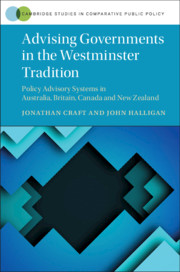 Advising Governments in the Westminster Tradition
Advising Governments in the Westminster Tradition Book contents
- Reviews
- Advising Governments in the Westminster Tradition
- Cambridge Studies in Comparative Public Policy
- Advising Governments in the Westminster Tradition
- Copyright page
- Dedication
- Contents
- Figures
- Tables
- Acknowledgements
- Glossary and Acronyms
- 1 Policy Advisory Systems
- 2 Comparative Contexts
- 3 Approaches to Understanding PAS and Change over Time
- 4 Public Services and Policy Advice
- 5 Ministerial Partisan Advisers and the Politicisation of PAS
- 6 Alternative Advice from within Government
- 7 External Advice
- 8 Understanding Westminster PAS Change
- 9 Trends, Tensions and the State of Neo-policy Advisory Systems
- Book part
- Notes
- References
- Index
8 - Understanding Westminster PAS Change
Published online by Cambridge University Press: 18 December 2020
- Reviews
- Advising Governments in the Westminster Tradition
- Cambridge Studies in Comparative Public Policy
- Advising Governments in the Westminster Tradition
- Copyright page
- Dedication
- Contents
- Figures
- Tables
- Acknowledgements
- Glossary and Acronyms
- 1 Policy Advisory Systems
- 2 Comparative Contexts
- 3 Approaches to Understanding PAS and Change over Time
- 4 Public Services and Policy Advice
- 5 Ministerial Partisan Advisers and the Politicisation of PAS
- 6 Alternative Advice from within Government
- 7 External Advice
- 8 Understanding Westminster PAS Change
- 9 Trends, Tensions and the State of Neo-policy Advisory Systems
- Book part
- Notes
- References
- Index
Summary
Chapter 8 analyses the patterns of change and the state of the respective systems. Comparative analysis provides an understanding of the types and nature of change, drawing attention to system-wide and localised modifications to advisory instruments. It also highlights distinct types of changes and the shared and distinct trajectories that have impacted the configuration and operation of these systems. The analysis focuses on differences in types of change by adapting Hall’s (1993) three ‘orders’ of change: first-order policy advisory systems (PAS) changes involving routine adjustments to existing practices or units; second-order change addressing the ascendency and decline of categories of advisers and shifts in advisory practices; and third-order macro-level changes. The trajectories of PAS change are distinguished by differences in tempo and sequencing, some being gradual and longer-term (e.g., erosion of public service capacity), while others are abrupt and transformational (e.g., responses to the global financial crisis). The cases feature different sequencing when (de)institutionalisation occurs (e.g., partisan advisers). The dynamics of externalisation and politicisation are reappraised using subtypes that reveal their breadth. The flexibility and adaptability inherent in PAS, government preferences and environmental pressures will lead to continuing change and the need for comprehensive approaches to understand it.
- Type
- Chapter
- Information
- Advising Governments in the Westminster TraditionPolicy Advisory Systems in Australia, Britain, Canada and New Zealand, pp. 159 - 177Publisher: Cambridge University PressPrint publication year: 2020


